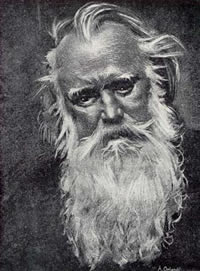
| Home | Introduction | Scope | Guides | Works |

|
Bibliographies
|
Biographies
|
Journals
|
Reviews
|
The Society, founded on the occasion of the sesquicentennial of Brahms's birthday in 1983, seeks to “foster and disseminate research on the life, music, and historical position of Brahms.” This journal is a good source of commentary on current and recent past research on Brahms. Of use to biographical research is Karl Geiringer's “Brahms the Ambivalent” found in vol. 1, no. 2 (Autumn 1983). It describes his simultaneous attraction to and repulsion from several concepts ranging from neatness and order to the desire to settle down with a family.
Avins challenges many of the previously established “facts” about Brahms's early life, particularly those that he grew up in a Hamburg slum to a family so poor that they sent him to brothels to play piano for additional income. She argues instead that his family was more middle-class and that Brahms's needs were well provided for.
Brahms was often described as being without social graces and concern for his fellow man. This article illustrates some of the reasons why Brahms was considered as such by his contemporaries. It focuses on correspondence and conversation between the composer and Josef Joachim, Otto Julius Grimm, Bernhard Scholz, Max Bruch, and Heinrich von Herzogenberg.
Swafford argues in favor of Brahms's own testimony on the subject of his juvenile nocturnal brothel piano performances and in doing so, directly counters Avins's article (see above) which appears in the same edition of 19th Century Music. Read both articles together for a closer look at Brahms's early life in Hamburg.